- Home
- John Barth
Final Fridays Page 13
Final Fridays Read online
Page 13
We are speaking here, after all, of admiration and inspiration, not of international trade balances. 20th-century Modernist and Postmodernist fiction owe much to Ireland, for example, for giving us James Joyce and Samuel Beckett; but Joyce’s and Beckett’s own navigation stars were from all over the literary firmament, and so it’s futile and pointless to try to calculate cultural trade deficits and surpluses—all the more so when we bear in mind my dictum that a writer’s navigation stars are not to be confused with his or her destination. 45 years ago, the brilliant novels of Joaquim Machado de Assis helped me to find my own first voice as a novelist. But much of what I borrowed from Machado to write The Floating Opera, Machado had borrowed in turn from Laurence Sterne’s Tristram Shandy, which I had not yet discovered for myself at that time, and which anyhow might not have had the impact on me that it did when reorchestrated by Machado’s Romantic pessimism. A dozen years later, Jorge Luis Borges’s Ficciones inspired me to imagine the possibilities of a Literature of Exhausted Possibility and what came later to be called Postmodernist fiction; but Borges’s own navigation stars were chiefly English, from Beowulf through G. K. Chesterton and Robert Louis Stevenson. Apollo be praised for such happy cross-cultural miscegenation!
Perhaps this mixed metaphor—international trade balances, celestial navigation, and DNA analysis—is itself a metaphor for my point: I have steered my own writerly course by the various lights of Faulkner, Joyce, Machado, and Borges, not to mention Cervantes, Boccaccio, Rabelais, and Scheherazade; my muse’s DNA, like that of most writers, is a mestizo smorgasbord of these and many other literary-ethnic inputs, and while I freely acknowledge my debt to them and to the assorted literary traditions that produced them, it is not the sort of debit that requires repayment. My books, whatever their worth, are my only intercultural bookkeeping. If, on some literary-critical balance sheet, those books show a net cultural deficit to Ireland, Brazil, Argentina, Spain, Italy, France, and medieval Araby, that debit is a debt merely of gratitude. And of gratitude I have a plenitude: if not yet quite cien años de, at least cinquenta años de gratitud.
Thank you; muchas gracias; et cetera.
A Window at the Pratt
Winners of the Enoch Pratt Society’s Lifetime Achievement in Letters Award, established in 1997, are expected to say a few words upon their accepting that distinction at Baltimore’s fine old Enoch Pratt Free Library and then, the following evening, to say a few more before giving a reading from their work. My receipt of that honor in 1999 prompted the following remarks on literary awards and then, the next day, the mini-essay after this one, on public readings—both published here for the first time.
JOHANN WOLFGANG VON Goethe once remarked to the Duke of Weimar—no doubt on the occasion of accepting some ducal honor—that refusing a distinction (as Boris Pasternak and Jean-Paul Sartre, for different reasons, declined their Nobel prizes in 1958 and 1964) can be as immodest as chasing after it. Philip Roth, upon accepting a New York Book Critics Circle Award, observed that since he, like many another writer, often feels that such prizes go to the wrong guy, this must be his night to be the wrong guy. John Updike’s character Henry Bech, upon accepting the Nobel Prize that his author surely deserves but has yet to be graced with,1 declares that that prize “has become so big, such a celebrity among prizes, that no one is worthy to win it, and the embarrassed winner can shelter his unworthiness behind the unworthiness of everyone else.” That reminds me of how the undergraduates at Washington College over in Chestertown, where my wife and I live, feel about the college’s prestigious Sophie Kerr Lit Prize, a $35,000 plum awarded annually for quite a few years now to one of their number, none of whom thus far (so they tell me) has subsequently evolved into a professionally publishing writer: So convinced are the student competitors that the Kerr Prize is cursed (“Sophie’s Curse,” they call it) that upon my being appointed a Senior Fellow of the college a few years back, I made it my first official act to pronounce that curse lifted. We’ll see what happens.2 And a writer friend of mine—as we were either applauding Gabriel García Márquez’s receipt of the Nobel in 1982 or else shaking our writerly heads at someone else’s receipt of it in some other year, I forget which—observed sagely that there are on the one hand those who do honor to the prize, and on the other hand those to whom the prize does honor.
Well: In the short history of the Pratt Society’s Lifetime Achievement award, my two forewinners (Saul Bellow and Joyce Carol Oates) have done enough honor to the prize to permit me simply to be honored by it—as I hope you’ll disagree. In any case, my thanks to the adjudicating committee, whoever you are, the difficulties of whose task I can appreciate, having paid my dues on a similar committee of the American Academy of Arts and Letters. Indeed, after doing three years’ hard time on that awards committee, while at the same time tisking at the Swedish Academy for passing over such contemporary giants as Vladimir Nabokov, Jorge Luis Borges, and Italo Calvino in favor of one or another lesser entity, I was led to what I think of as the Tragic View of Recognition: namely, that a worthwhile literary prize is one that will at least occasionally be bestowed upon an author despite the fact that she or he happens to deserve it. By that stringent definition, the Pratt Prize has a high credit rating indeed, to which I hope tonight’s occasion will not do lasting damage.
That said, I must confess to feeling a slight chill in the presence of any “Lifetime Achievement” award. Since I persist in still going to my writing-table every weekday morning to see what my muse has on her mind, I can’t help wishing that the thing would say “Lifetime Achievement Thus Far.” In any case, as I used to tell my apprentice fiction-writers up at Johns Hopkins, lit prizes are a bit like PhDs: They don’t invariably equate with excellence (in some cases they may barely equate with proficiency), and some of the very best practitioners don’t have them. But if you’re going to be shrug-shouldered about either literary prizes or doctoral degrees, it’s better to be so after winning them, so that your shrug-shoulderedness can’t be mistaken for sour-grapes envy.
ALLOW ME NOW a very brief reminiscence, and then we’re done. As an undergraduate apprentice myself at Johns Hopkins in the late 1940s, my comrades and I would often take the bus downtown from the university’s Homewood campus to the Pratt, where in addition to using this library’s splendid resources we would admire and envy the authors whose works were honored back then with displays in the building’s street-side windows. Libraries, after all, as William H. Gass somewhere remarks, “acquire what we cannot afford, retain what we prize and would adore, restore the worn, ignore fashion, and repulse prejudice.” Your typical would-be writer, says W. H. Auden, “serves his apprenticeship in a library [I certainly did—but that’s another story].” “Though the Master is deaf and dumb,” Auden continues, “and gives neither instruction nor criticism, the apprentice can choose any Master he likes, living or dead; the Master is available at any hour of the day or night; lessons are all for free; and his passionate admiration of his Master will ensure that he work hard to please him.” Especially to those of my fellow apprentices who (unlike me) had grown up in Baltimore and had made excursions to the Pratt all through their childhood, there seemed to be no more incontrovertible affirmation and validation of one’s writerly calling than to earn, one day, “a window at the Pratt.” I’m honored to regard tonight’s award as my Pratt-window; although I hope that I may have a few stories left to tell, I accept with pleasure this recognition of The Stories Thus Far.
On Readings
YESTERDAY EVENING, IN the course of accepting the Enoch Pratt Award,1 I delivered myself of a few remarks about the pros and cons of literary prizes in general. This evening, before reading to you a short section from the nearly-finished “millennium” novel that I’ve been at work upon since 1995,2 I want to make a few remarks about Public Readings in general.
What prompts me this evening is an observation by my distinguished fellow fictioneer Kurt Vonnegut, Jr., as quoted some few weeks ago in the “Today” section
of the Baltimore Sun: Mr. Vonnegut allowed as how he gives “talks” here and there from time to time (indeed, he has done so as our guest in the Johns Hopkins Writing Seminars, for example), but “I’ve never done a reading,” he declared, and then added: “It’s the lowest art form imaginable.”
Well, now. This sentiment echoes that of some other notable writers I’ve heard on the subject: I think, e.g., of Mr. Mark Helprin, who voiced a similar opinion to his audience up at Hopkins (in fact, Mr. Helprin devoted his whole allotted public hour with us to explaining why he wasn’t going to give a reading). I think of Gore Vidal’s remark somewhere that public readings by authors, especially on the campus circuit, are “just a form of show biz.” And Baltimore’s own Anne Tyler, who once did a well-received reading for us from her then-new novel Morgan’s Passing, decided subsequently that fiction-readings are a bad idea, and although she visited our Writing Seminars again thereafter, she confined herself to chatting with a roomful of apprentice writers.
In certain cases, I suspect, a writer’s disinclination to public readings may stem from simple platform-shyness or the circumstance of that writer’s not happening to be an effective public reader of his or her work. (Neither of those factors, let me say at once, applies to Ms. Tyler, whose presentation was confident and capable, a pleasure to attend.) But some more general objections to public readings are worth considering apart from those circumstances, and I’d like to review them before I myself descend to this “lowest form of art.”
It is a matter that I feel reasonably qualified to address. For one thing, in my years of professoring at Penn State, State University of New York at Buffalo, and especially Johns Hopkins—where my job-description included inviting writers to visit the campus, confer with our students, and give public presentations—I have heard every sort of delivery: from the masterful to the inept, from the histrionic to the eye-glazingly monotonous, from the exhilarating to the embarrassing, or the intoxicating to the intoxicated, and including the over-long, the inaudible, and the all but unintelligible, whether owing to the speaker’s accent, the room’s acoustics, the nature of the material, or possibly some foreign substance in the lectern water-pitcher. Moreover, I confess to being guilty myself, over 40-plus years as a publishing writer, of 400-plus public readings from my output, whether of work already published, or of work “finished” but not yet published, or (as is the case with tonight’s material) of work not-yet-even-quite-finished but close enough thereto to risk reading from it without tempting the muses to strike, or to go on strike. What’s more, I have almost invariably found the experience agreeable, despite the occasional fouled-up airline connection and the occasionally disappointing, disappointed, or less than entirely comprehending audience—as in, say, Tokyo or Tangier.
Part of my pleasure in reading publicly from my fiction (or from other folks’ fiction, as I’ve done in homages to Samuel Beckett, Italo Calvino, Jorge Luis Borges, and other of my heroes) has nothing to do with the pros and cons of readings as an art-form but rather with the biographical circumstance that I happen to be a once-upon-a-time jazz drummer and orchestrator who still enjoys the opportunity of trying selected riffs on a live audience instead of a merely living one, as is the normal case with writers and their readers. What’s more, aside from affording me the occasional change of scene and a modest supplement to what for most of my academic history was a fairly modest teaching salary and what remains, in the nature of my literary case, a blushingly modest royalty income, these reading/lecture sorties have brought me quite unexpected other boons as well, of which I will mention only the most blessed and life-altering one: On a snowy night in February 30 years ago, after a hairy flight from my Buffalo campus to Boston to do an evening gig at Boston College—a reading that I started at least half an hour late, on an empty stomach, because of snow delays at the airports and on the streets of Boston—it was my extraordinary good fortune to re-meet and renew my acquaintance with a former student from Penn State days who had loyally shlepped across town through the snowstorm to hear her old teach’s spiel, and who subsequently became and to this hour remains my bride, my keenest-eyed reader, and my editor of first resort.
BUT THAT’S ANOTHER story, which—like the circumstance of one’s happening to be a good, bad, or middling public reader—has nothing to do with the pros and cons of “readings” themselves as a form of art and entertainment. Let me quickly review those pros and cons, offer my own opinions themupon, then read my reading, and then, I hope, respond to your questions or comments on this or any other reasonably pertinent subject.
First, the Cons: The printed word can reasonably be argued to be meant for the silent eye, not for the ear: a private, “privileged” transaction between author and individual readers, not a communal experience like theater, or like the oral tale-telling tradition out of which written and eventually printed fiction evolved. The reader of print proceeds at his/her own pace—lingering, considering; perhaps rereading a particularly striking or puzzling passage before going on; perhaps skimming a bit to cut to the chase, so to speak, or to cut out the chase if one so chooses; perhaps peeking ahead to check the distance to the next space-break or chapter-division (what might be called “chasing to the cut”); perhaps leafing back to remind oneself where a particular character or image last appeared, and reading neither more nor fewer minutesworth of pages than one has the time and motivation to ingest at a given sitting. In short, the medium of print is interruptible, referable, and pace-adjustable by the individual reader, as theater and film are not (setting aside the function-buttons on videocassette players), and as the oral tale-telling tradition was not (unless you were the king ordering Homer to do a high-speed encore of his Catalogue of Ships, I suppose, or a grandkid begging Grandma to do the wolf-in-the-bed scene one more time). Interruptibility, Referability, and Pace-Adjustability: three terrific virtues of the print medium, and of course they’re lost in public readings.
Lost too is the absence of the possibly distracting physical presence of the Author, along with our imagination of the narrative “voice” and the voices of the several characters. We often speak of a writer’s having a distinctive voice—languid, eloquent, restrained, jazzed-up, tender, forceful, whatever—but the voice we’re speaking of is a figurative, not a literal one. And the narrative voice that so moved and/or entertained us on the silent page may turn out in authorial person to be bothersomely lisping, or hesitant, or strident, or perhaps female baritone or male soprano when it’s doing dialogue. In the same way, we may have an agreeable image of the author of our pleasure and then find ourselves disappointed if not altogether turned off by his/her actual speaking presence. And finally, of course, we can go read the thing for ourselves, if not immediately then whenever it hits the stands, in the medium for which it was presumably designed; so why bother hauling out to watch and hear its perpetrator perp a portion of it in person?
The answer, of course, is that there is no reason at all, if that’s the way one feels. And it goes without saying (but let’s get it said anyhow) that some reasons for going to hear a writer read have little or nothing to do with the art of literature, however defensible they may be otherwise: innocent curiosity about the live performing presence of a literary celebrity, or of a non-celebrity whom we happen to admire or be merely curious about; curiosity about an author’s work in progress, if we’ve enjoyed earlier fruits from the same tree; the opportunity, perhaps, to ask or anyhow attend a question or two or three (as I much hope you’ll do in Part Three of our time together); to turn the monologue of printed fiction into a dialogue.
ET CETERA. BUT none of these considerations has to do with public readings as an art form. They may justify, even partially vindicate, my presence here onstage this evening and yours in the audience, or my presence in the audience some other evening to hear some other writer onstage. But is it art, or art of other than the lowest order?
IN THE CASE of a great many fine poets, it unquestionably is art, of a very high order. The utte
rance of lyric poetry is no doubt more intimately bound to speech than is the recitation of prose; one remembers somebody-or-other’s definition of poetry as “memorable speech,” and any of us fortunate enough to have heard the likes of Dylan Thomas or Robert Frost or Anne Sexton speak their poems has experienced an unforgettable dimension of that verbal art beyond its silent presence on the printed page. But what about poor old fiction? Here are three things that I believe:
1. That the art of reading it publicly is different from the art of writing it. The well-written story and the well-spoken story are two different entities, although a given text may happen to be suitable for both.

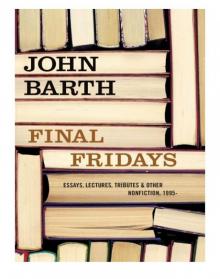 Final Fridays
Final Fridays Where Three Roads Meet: Novellas
Where Three Roads Meet: Novellas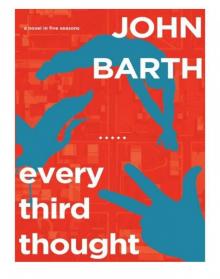 Every Third Thought: A Novel in Five Seasons
Every Third Thought: A Novel in Five Seasons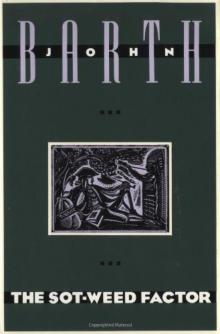 The Sot-Weed Factor
The Sot-Weed Factor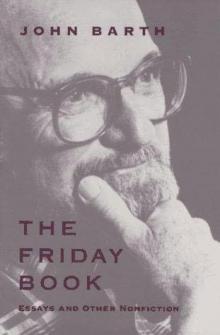 The Friday Book
The Friday Book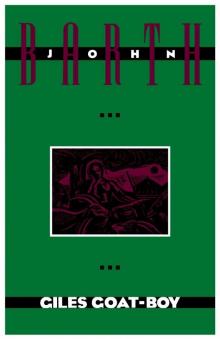 Giles Goat Boy
Giles Goat Boy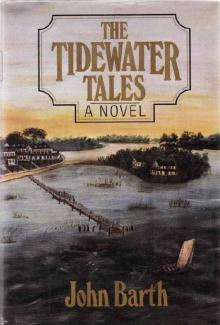 The Tidewater Tales
The Tidewater Tales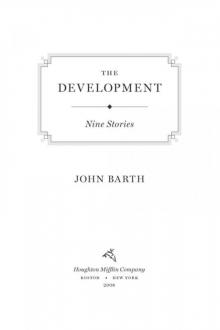 The Development
The Development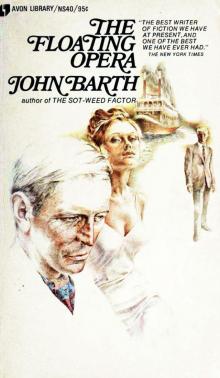 The Floating Opera
The Floating Opera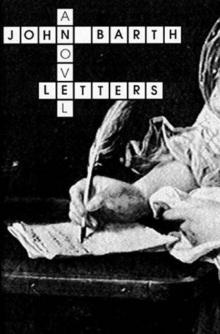 Letters
Letters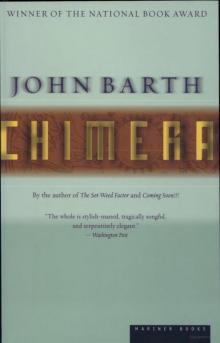 Chimera
Chimera Where Three Roads Meet
Where Three Roads Meet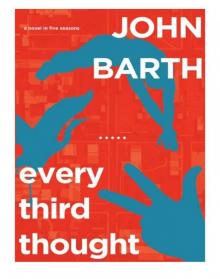 Every Third Thought
Every Third Thought